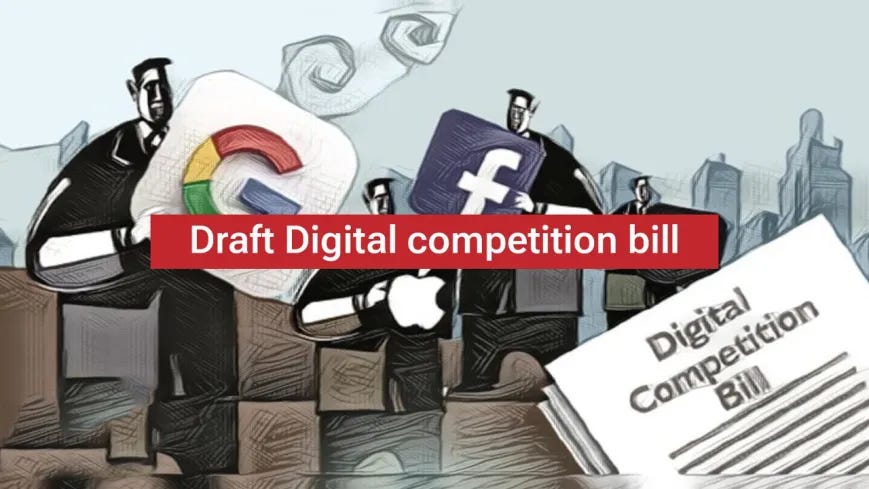Part II: Decoding India's Digital Competition Bill: Implications on Startups and MSME Ecosystems
By Shradhanjali Sarma
Introduction
The Draft Digital Competition Bill, 2024, unveiled by the Committee on Digital Competition Law in April, signals a significant shift in the regulation of big tech companies in India. Spanning 236 pages, this comprehensive report lays out recommendations aimed at addressing concerns within the digital competition market. It emphasises the need for timely detection of digital competition issues, ensuring compliance with existing laws, and expediting proceedings involving entities in the digital realm.
Finance and Corporate Affairs Minister Nirmala Sitharaman received the report on March 12, 2024, and promptly opened the floor for public feedback, extending the consultation period until April 15, 2024. However, the Bill's unveiling triggered immediate concerns among industry players, particularly major tech giants like Meta, Google, Uber, and Amazon.
As discussed in the previous article, these companies have voiced reservations regarding the necessity of implementing preemptive regulation for digital markets. Currently, competition law predominantly relies on post-event regulation, intervening only after anti-competitive or unfair practices are identified. In contrast, the proposed Bill seeks to establish a precautionary regulatory framework, prompting debate within the industry about the implications and necessity of such measures.
Impact on Startups and MSMEs
While the Bill has left most big techs unhappy due to the increased compliance burden, it has also created worry among the growing startups. Despite the focus on the implications for major tech companies, startups are also expressing apprehensions about the Bill. They are raising concerns alongside industry giants regarding the potential impact of the proposed legislation.
Startups are highlighting a significant worry regarding the Bill, 2024: the broad scope of the term "Systematically Significant Digital Enterprises" (SSDEs). This classification potentially encompasses startups along with major tech players. According to a report by CUTS, 13 digital companies/platforms other than big techs in India that fall under the definition of SSDEs outlined in the Bill. Consequently, startups fear that they will be impacted just as much as the established big tech companies by the proposed legislation.
As per the Bill, SSDE is an entity providing "core digital services" and which have a turnover in India of at least ₹4,000 crore, a global turnover of at least $30 billion, a gross merchandise value in India of at least ₹16,000 crore, or a global market capitalization or fair market value of $75 billion. Additionally, the entity must have had at least 1 crore end users or at least 10,000 business users in India in each of the preceding three financial years. To be designated as an SSDE, companies would need to meet substantial financial and user base thresholds, including minimum turnovers in India and globally, a large user base, and market capitalization or fair market value. As per the report by CUTS, digital intermediaries such as Zomato, PayTM, Meesho, Nykaa etc fall under the definition of SSDE, even though they are not big techs. This implies that the Bill will have an impact on them in relation to compliance burden.
In addition to the above, most startups would prefer not to be labelled as an SSDE. Startups in order to not fall under the definition would prefer not to innovate or expand, thus impacting their growth and their ability to compete with large players in the market. Additionally, there's apprehension about the impact of proposed ex-ante regulations on venture investments in tech startups. The thresholds outlined in the bill are feared to restrict the scalability of businesses, thereby acting as a deterrent to investment.
As per a report titled ‘Survey-Based Assessment Of The Impact Of The Draft Digital Competition Bill, 2024 On MSMEs In India’, the Bill will have substantial impact on MSMEs as well. This is due to the restrictions on the usage of data by SSDEs. The Bill restricts SSDEs from the use of non-public data of business users for competitive purposes and requires explicit consent for intermixing or cross-using personal data collected from different services. Furthermore, SSDEs must facilitate easy portability of data for both business users and end users of their core digital services. This would have a trickle down effect on the MSMEs as most MSMEs are dependent on targeted advertising for revenue generation as well as customer acquisition. According to the report, 61 percent of surveyed MSMEs suggest that restrictions imposed on targeted advertising by major digital platforms under the Bill will adversely affect them. Additionally, frequent pop-ups for consent for data usage would not provide customers with a good experience of using a digital platform.
In addition, the Bill also discourages SSDEs from providing bundle/tie up services. For instance, a bundle of Google services such as Google Cloud, Google single sign-on, and Google Analytics will be restricted under the Bill. This will have an impact on businesses as it will affect user experience as well as price of the services. In addition, this would have a trickle down impact on MSMEs. For example, a single sign-in feature allows an user to log-into a digital platform using their Google account without creating a separate account. This enhances user experience as they don’t have to remember multiple usernames and passwords. Single sign-in feature is beneficial for MSMEs as well as it helps them to customers.
Conclusion
The burgeoning digital landscape in India is filled with growth potential, but a restrictive approach to innovation could prove discouraging for businesses. The debate surrounding ex-ante regulations within the Bill is warranted, as it carries the risk of stifling innovation. This preemptive approach resembles administering medication before the onset of a disease, which might be counterproductive in a dynamic digital economy. Furthermore, startups may hesitate to join the expanding pool of companies, fearing that growth would subject them to the SSDE classification, thereby escalating compliance obligations. Additionally, regulatory barriers could dissuade investors from backing startups.


